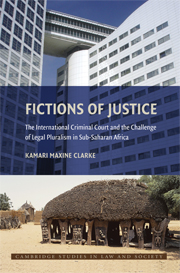 Fictions of Justice
Fictions of Justice Published online by Cambridge University Press: 23 January 2010
PROLOGUE: THE INTERNATIONAL CRIMINAL COURT AND THE DEMOCRATIC REPUBLIC OF THE CONGO
In November 2006, the International Criminal Court (ICC) – in pursuit of the quest for justice – began its first-ever hearing before the Pre-Trial Chamber. Thomas Lubanga Dylio, the accused, was charged with using child soldiers to commit violent murders. The prosecution presented him as the alleged leader of a Congolese militia responsible for ethnic massacres, torture, and rapes in the eastern part of the Democratic Republic of the Congo (DRC). Jean Flamme, the lead defence attorney for Lubanga at the time, countered by characterizing his client as a nonviolent man, a shepherd who wanted to lead his flock to peace and whose principal goals were to secure ethnic reconciliation and the equitable distribution of natural resources within the DRC. Lubanga “is a patriot,” Flamme contended. “He is a man who wants to defend his people.” Portraying Lubanga as a pacifist politician, Flamme maintained that tribal conflict in Congo's “lawless” Ituri region was so violent that people were often hacked to death and sometimes even eaten in the years before Lubanga managed to forge peace in 2003. Lubanga was described as having “entered the political realm by chance in a country that was in chaos.…[H]e was considered a man who was able to put an end to the violence.” According to Flamme, the reality was that Lubanga, by advocating equitable distribution of Congo's vast mineral wealth, had upset powerful business opponents in both Congo and neighboring Uganda.
To save this book to your Kindle, first ensure [email protected] is added to your Approved Personal Document E-mail List under your Personal Document Settings on the Manage Your Content and Devices page of your Amazon account. Then enter the ‘name’ part of your Kindle email address below. Find out more about saving to your Kindle.
Note you can select to save to either the @free.kindle.com or @kindle.com variations. ‘@free.kindle.com’ emails are free but can only be saved to your device when it is connected to wi-fi. ‘@kindle.com’ emails can be delivered even when you are not connected to wi-fi, but note that service fees apply.
Find out more about the Kindle Personal Document Service.
To save content items to your account, please confirm that you agree to abide by our usage policies. If this is the first time you use this feature, you will be asked to authorise Cambridge Core to connect with your account. Find out more about saving content to Dropbox.
To save content items to your account, please confirm that you agree to abide by our usage policies. If this is the first time you use this feature, you will be asked to authorise Cambridge Core to connect with your account. Find out more about saving content to Google Drive.